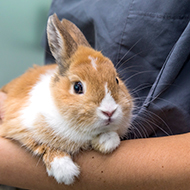New rapid test for difficult-to-diagnose rabbit parasite

E.cuniculi is a microscopic parasite of the nervous system and kidneys that commonly affects rabbits.,
Horiba UK has launched a new rapid PCR test for domestic rabbits to detect E.cuniculi - a microsporidian parasite that is notoriously difficult to diagnose.
In a press release, the diagnostics firm said its new POCKIT Central analyser can deliver fast and accurate results within 85 minutes and supports better patient management by enabling faster treatment.
E.cuniculi is a microscopic parasite of the nervous system and kidneys that commonly affects rabbits. Animals infected with the parasite may have paralysis, seizures, head tilt, renal insufficiency and ocular disorders.
The new system promises to be user-friendly and can automate the PCR testing process for up to eight pathogens in a single run.
HORIBA veterinary business manager Paul Lymer said: “We are pleased to offer the capability of PCR testing to all practitioners, with a simple process that does not require a separate area, specialist staff or facilities. With the continued addition of rapid assays such as E. cuniculi to its wide range of tests, POCKIT Central’s ‘sample in, result out’ technology enables veterinary teams to work more efficiently and enhance patient care.”
Further information is available at horiba.com



 The RCVS has announced a new version of its 1CPD mobile app, with enhanced features for veterinary surgeons and veterinary nurses to record their continuing professional development.
The RCVS has announced a new version of its 1CPD mobile app, with enhanced features for veterinary surgeons and veterinary nurses to record their continuing professional development.